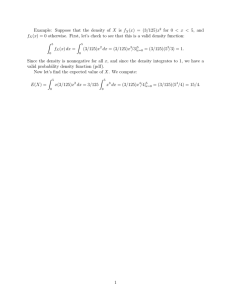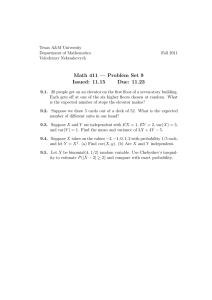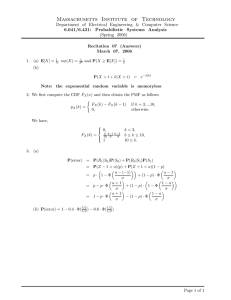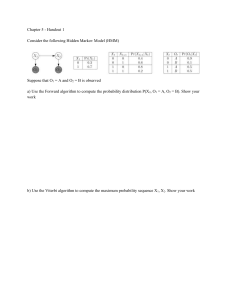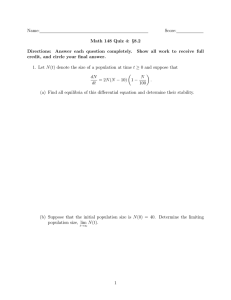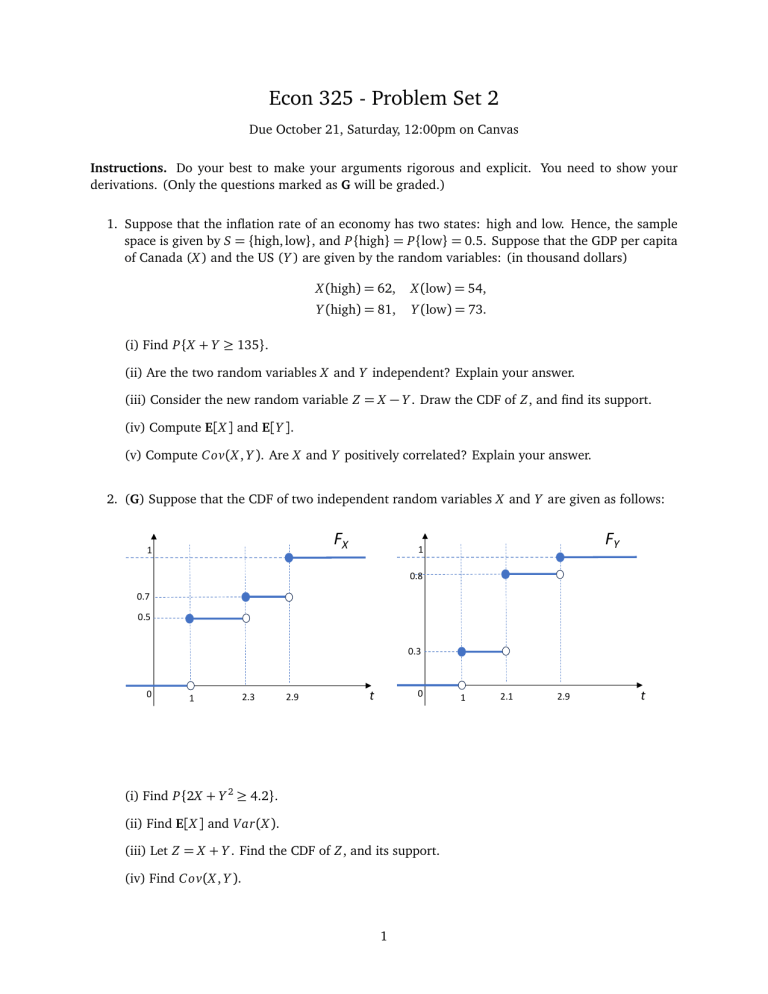
Econ 325 - Problem Set 2
Due October 21, Saturday, 12:00pm on Canvas
Instructions. Do your best to make your arguments rigorous and explicit. You need to show your
derivations. (Only the questions marked as G will be graded.)
1. Suppose that the inflation rate of an economy has two states: high and low. Hence, the sample
space is given by S = {high, low}, and P{high} = P{low} = 0.5. Suppose that the GDP per capita
of Canada (X ) and the US (Y ) are given by the random variables: (in thousand dollars)
X (high) = 62,
X (low) = 54,
Y (high) = 81,
Y (low) = 73.
(i) Find P{X + Y ≥ 135}.
(ii) Are the two random variables X and Y independent? Explain your answer.
(iii) Consider the new random variable Z = X − Y . Draw the CDF of Z, and find its support.
(iv) Compute E[X ] and E[Y ].
(v) Compute C ov(X , Y ). Are X and Y positively correlated? Explain your answer.
2. (G) Suppose that the CDF of two independent random variables X and Y are given as follows:
FX
1
FY
1
0.8
0.7
0.5
0.3
0
1
2.3
2.9
0
t
(i) Find P{2X + Y 2 ≥ 4.2}.
(ii) Find E[X ] and Var(X ).
(iii) Let Z = X + Y . Find the CDF of Z, and its support.
(iv) Find C ov(X , Y ).
1
1
2.1
2.9
t
3. Suppose that we have two discrete random variables X and Y whose PMFs, pX and pY , are given
by
pX (1) = 0.4,
pX (2) = 0.6,
pY (1) = 0.3,
pY (2) = 0.7.
Suppose further that X and Y are independent.
(i) Compute the probability that X + Y = 3.
(ii) Find Var(2X + 3Y ).
4. (G) Suppose that the joint probability table of two discrete random variables X and Y is given as
follows:
X \Y
10
20
30
100
0.3
0.1
0.0
200
0.2
0.1
0.3
(i) Compute the probability that X + Y = 130.
(ii) Find C ov(X , Y ). Are X and Y positively correlated? Explain your answer.
(iii) Find Var(X + 4Y ).
5. Suppose that the CDF FX of a continuous random variable X is given as follows:
t < 0.5
0,
3
2
FX (t) = 2t − t , 0.5 ≤ t < 1,
1,
t ≥ 1.
(i) Find the PDF of X .
(ii) Find E[X ] and Var(X ).
6. (G) Suppose that the PDF f X of a continuous random variable X is given as follows:
t <0
0,
f X (t) =
3t 2 ,
0,
(i) Find the CDF of X .
(ii) Find E[X ] and Var(X ).
2
0 ≤ t < 1,
t ≥ 1.
7. (G) Suppose that (X i , Yi ), i = 1, ..., n, are i.i.d. random vectors, where n ≥ 3. (Recall the meaning
of i.i.d. random vectors in Section 1 of Chapter 6 in the Lecture Note.)
(i) Is it true that C ov(sin(X 1 ), exp(X 2 )) = C ov(sin(Y1 ), exp(Y2 ))? Explain your answer.
(ii) Suppose that P{X 1 ≤ 1} = 0.5 and P{Y1 ≤ 1} = 0.7. Compute the following probability:
P{X 1 ≤ 1 and Y2 > 1 and X 3 ≤ 1}.
3
